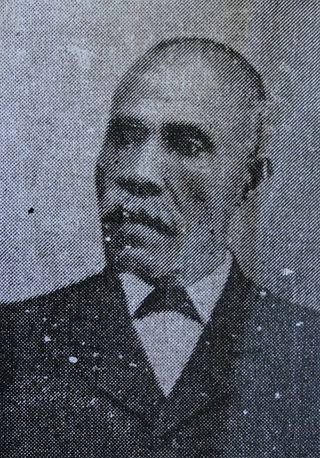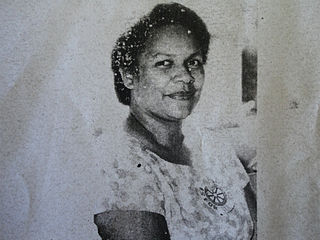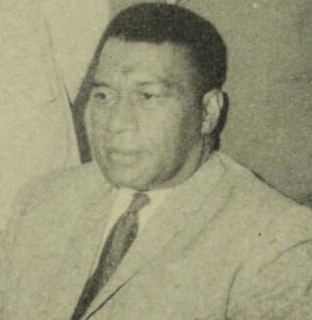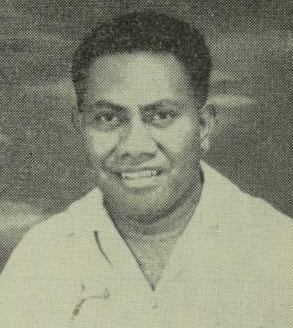Related Research Articles

RatuSeru Epenisa Cakobau was a Fijian chief,monarch,and warlord (Vunivalu) who united part of Fiji's warring tribes under his leadership,establishing a united Fijian kingdom. He was born on Natauloa,Nairai Island in Lomaiviti but spent his youth on Vanuaso,Gau,Lomaiviti,later returning to Bau to re-establish his Father's Ratu Tanoa Visawaqa reign. Ratu Epenisa Seru Visawaqa was given the name "Cakobau" meaning destroyer of Bau,in reference to his grandfathers' (Nailatikau) effort to first claim the tile from the people of Butoni and Lovoni,returned with most of his warriors from Vanuaso,Gau,Lomaiviti to coup the leadership in Bau then and later takeover his father's title;known after his father as the 6th "Vunivalu" or Warlord of Bau.
Ratu is an Austronesian title used by male Fijians of chiefly rank. An equivalent title,adi,is used by females of chiefly rank. In the Malay language,the title ratu is also the traditional honorific title to refer to the ruling king or queen in Javanese culture. Thus in Java,a royal palace is called "keraton",constructed from the circumfix ke- -an and Ratu,to describe the residence of the ratu.

RatuJoni Madraiwiwi was a Fijian Ratu and early colonial administrator in what was then the British Crown Colony of Fiji.
AdiLitiana Maopa (1864-1933) was a prominent member of two of Fiji's main chiefly houses,those of the Tui Nayau,the paramount chief of the Lau Islands,and the chiefly house of the Vunivalu of Bau the paramount chief of the Kubuna Confederacy.
Kapaiwai Tuimacilai Mara,chiefly seafarer,and descendant of the Vunivalu of Bau.
Bau is the main village on Bau Island,Fiji. Once integral to the power and economy of the chiefly village,the villages of Lasakau and Soso are also located on the twenty-two acre island which became the centre of traditional power throughout the Fiji Islands in the nineteenth century.

AdiLosalini Raravuya Dovi was a Fijian politician and lady of rank in Fiji's chiefly leadership. In 1966 she was jointly one of the first women elected to parliament,serving in the House of Representatives until 1977. She also served as Assistant Minister for Urban Development and Social Welfare from 1975 to 1977.
RatuJione Atonio Rabici "Tom" Doviverata was a Bau chief and medical doctor and administrator in colonial Fiji.

General elections were held in Fiji in July 1937,the first in which an equal number of Europeans and Indo-Fijians were elected.

General elections were held in Fiji in August 1950. Voting took place in most locations on 26 August,and in the Lau and Lomaiviti Islands between 21 and 28 August.

RatuGeorge Cokanauto Tuisawau was a Fijian chief and politician. He was Roko Tui of Rewa from 1936 until 1961,and spent two decades as a member of the Legislative Council.

Ratu Deve Toganivalu was a Fijian chief and politician. He was Roko Tui of Bua from 1909 until 1928 and a member of the Legislative Council between 1926 and 1938.
Ratu George Toganivalu was a Fijian chief and politician. He was Roko Tui of Bua and Ba,and a member of the Legislative Council between 1940 and 1951.
Ratu Apakuki Tuisue Nanovo was a Fijian chief and politician. He served as a member of the Senate between 1970 and 1977.

William Granger Johnson was a Fijian businessman and politician,serving as a nominated member of the Legislative Council in two spells during the 1940s and 1950s.
RatuPenijamini Veli was a Fijian chief,civil servant and politician. He served as a member of the Legislative Council from 1937 until his death the following year.
RatuMarika Vukinamualevu Ratoto Latianara was a Fijian chief and Senator.
RatuSirJone Latianara Kikau was a Fijian chief,civil servant and politician. He served as a member of the Senate from 1973 to 1979.

RatuNapolioni Naulia Dawai was a Fijian chief and politician. He served as a member of the Senate and House of Representatives from 1970 to 1986.

RatuMeli Loki was a Fijian chief,businessman and politician. A pioneer in the indigenous Fijian tourism industry,he served as a member of the Senate between 1979 and 1982.
References
- 1 2 3 4 5 6 Ratu Tiale Wimbledon Thomas Vuiyasawa Pacific Islands Monthly, May 1981, p81
- ↑ Ratu Tiale Vuiyasawa NZ History
- ↑ Fijian Chiefs Would Hand Over Land to Government Pacific Islands Monthly, November 1936, p63
- ↑ Ratu Tiale Vuiyasawa Pacific Islands Monthly, December 1938, p33
- ↑ Ratu Tiale Vuiyasawa Pacific Islands Monthly, February 1952, p57
- ↑ Ratu T.W.T Vuiyasawa Pacific Islands Monthly, June 1957, p117